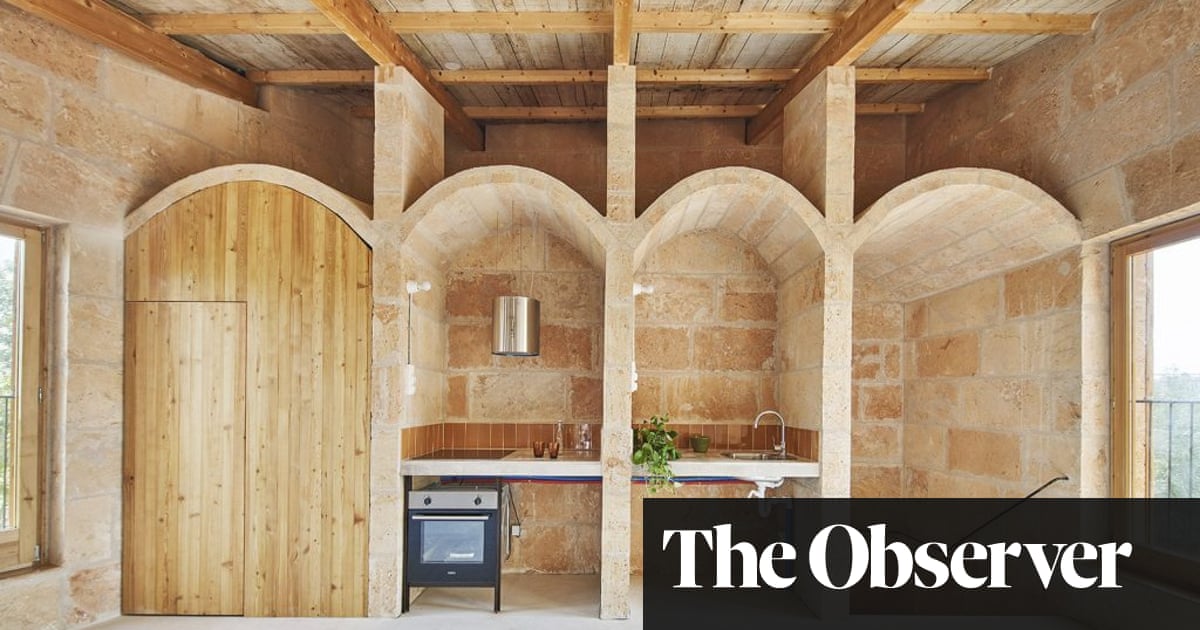
In a park opposite Belfast’s Saint Anne’s Cathedral, Jamie-Lee O’Donnell is being photographed. It is a small, unassuming shoot; she has only popped outside briefly, catching a short spurt of sunshine on an otherwise gloomy Saturday. Yet within minutes, passersby are stopping on surrounding streets: murmurs of excitement, fingers pointing. A steady stream of selfie-hungry teenage girls muster up the courage to edge closer. “Oh feck,” I hear from behind me, “that’s Michelle from Derry Girls!”
Now filming its third and final series, Derry Girls has proved popular beyond all expectations. Critical acclaim was matched by nationwide public adoration: the show was Channel 4’s biggest new comedy in five years. And in Northern Ireland, the joyful sitcom set in 1990s Derry is a fully fledged sensation; the most watched series in the country since modern records began. Overnight, its lead actors were elevated to national treasure status. En route to meet O’Donnell, I had mentioned the purpose of my visit to my stoic, middle-aged taxi driver and he immediately turned giddy. Later, a mix-up over permissions to take pictures inside the gallery where we’re meeting was quickly resolved: one of the Derry Girls, is it? No bother, carry on.
“It’s just so lovely,” O’Donnell says, taking a seat opposite me back inside the city’s Metropolitan Arts Centre (the Mac). “When we film outside in Derry, we often have to ask our audience to keep it down while we’re shooting a scene.” O’Donnell lived in the city for most of her life, although recently she has moved to another part of the country. She would rather not say where exactly. “I had a wee bit of trouble with people finding out where we lived and coming to say: ‘Hello, here’s my grandma.’”
In Derry Girls, the 34-year-old plays the much-loved Michelle, a sexually liberated schoolgirl with a penchant for profanity. Her sharp one-liners are a series standout: “Do you think if I told him I had an incendiary device down my knickers he’d have a look?” she asks, when armed soldiers board her bus unannounced. In person, O’Donnell shares Michelle’s quick wit. She is also thoughtful and warm, and if anything a little nervous, a far cry from the abrasive over-confidence she exudes in the show as Michelle.
We are here today to talk about her upcoming show, Screw, a gritty drama set in the wing of a men’s prison. O’Donnell takes on the part ofplays Rose, a freshly hired trainee guard. “She’s a really strong, tough young woman,” O’Donnell says of her character. “There’s something about her which just spoke to me: she undervalues herself a lot, and doesn’t see the strength inside her.” In almost every way, Michelle and Rose are polar opposites. “Although,” she adds, straight-faced, “they do happen to have the same curly hair.”
O’Donnell is fiercely proud of being a true Derry girl. She grew up on the border between County Derry and Donegal; the north and the Republic. Despite being a generation on from the character she plays in Derry Girls, set in the years before the Good Friday agreement was signed in 1998, she too was raised in the shadows of the Troubles. “It’s such recent history, and a vital part of who people in Derry are,” she says. “It shapes our outlooks, our humour, our personalities. How we feel things so strongly, and love so fiercely.”
Creating characters through her childhood allowed her to imagine other possibilities. “I was such a little weirdo,” she recalls with a grin. “I had so many outfits to dress up in. I’d make up these personas, each with different hats. I’ve no idea where I got them.” Every evening, she would come to dinner with a show to perform at the table. Drama school was never on the cards, in part because of the cost, but it also wasn’t on the family’s radar. That is not to say that her creative side wasn’t encouraged: she would write poetry, plays and songs, and stand in Derry city centre, ready to perform intense immersive theatre to any unsuspecting shopper who would catch her eye.
After a brief stint at Leicester’s De Montfort University, O’Donnell dropped out and set about trying to find herself an agent. She found gigs as a self-taught nightclub dancer and performed in pantos. She moved around in search of work – London, Belfast, Manchester – taking on whatever she could, be it retail or restaurant work, or on-street promotions. “I managed a Santa’s grotto for a while,” she says. “I had to fire two elves for coming in drunk, stinking of booze, after clubbing all night at the Warehouse Project. I could hear them wobbling towards me because of the bells on their hats and shoes.” One of them threw up in a bin while Santa was with a group of toddlers.
“Around then was the first time I really realised where I was from,” O’Donnell says. “I got a job working at a coffee shop in Manchester. I remember flicking through my contract and asking the other staff: why doesn’t it say whether you get paid for bomb scares? Back at home, this was a standard question: will I lose wages if we’re forced to close for an evacuation? But they all looked back at me like I had two heads.”
By 2017, O’Donnell had returned to Derry and bought a corner shop. “It was good craic,” she says. “I was eating crisp sandwiches constantly. I didn’t make any money, if anything I lost a bit.” It was then, finally, that acting work started to come in regularly. She shut up shop when she was cast in a touring production of I Told My Mum I Was Going on an RE Trip, a play about young women’s abortion experiences. “We actually performed it right here at the Mac,” she says. “There were people protesting outside, saying it was an abomination.” Access to abortion services remains difficult in Northern Ireland today, but back then abortion rights were almost nonexistent in the country, except in the most extreme of cases. “I’m very proud of that show,” O’Donnell says. “To have helped continue the conversation. In my opinion, it’s healthcare for women. It’s really close to my heart. It affects me directly.”
Around the same time, O’Donnell read an article about a new Channel 4 sitcom written by the Derry-born writer Lisa McGee. “Right away I knew it would be hilarious,” she says. “I was desperate to be a part of it. As soon as I read the scenes, I felt something. I knew every single one of these girls.”
There were eight months between O’Donnell’s first audition and casting, during which time she presumed it simply wouldn’t happen. When she got the call to say she had bagged the part, the years of graft felt worth it. During filming – on intensive Belfast shoots, and on location in Derry – cast and crew would laugh constantly. “We all had this feeling,” she adds, “but we didn’t want to jinx it. Then the first episode came out, and everything went crazy. It hasn’t stopped since.”
There is magic, certainly, in the show’s performances and writing. But it’s the personal, heartfelt portrait of a place so rarely seen or heard of outside the context of conflict and tension that truly casts a spell. “We’ve been able to show the world the real Derry,” O’Donnell says. “Not the one from the news, but our one. Not a conflict zone, but a community. It’s such a huge responsibility …” O’Donnell, tears in her eyes, takes a second. “Sorry,” she sniffs, smiling. “It’s just nice to show the Derry we know. Why am I getting upset? This is ridiculous.”
Saying goodbye to Michelle was always going to be sad. Derry Girls has changed her life for ever. “When you step on set as Michelle,” she says, “the gloves are off and you can just go full-throttle ballistic. There’s this freedom whenever I’m playing her.”
With Screw about to be released and Derry Girls ending, O’Donnell is in a state of transition. On screen, she is going from schoolgirl to working woman, but her own life is also evolving. Initially, when things took off, she felt out of place at red-carpet events; enjoying her successes felt indulgent, but that is changing.
“It’s almost turning to guilt now,” O’Donnell says. “Maybe that’s too strong a word. It’s just my identity was shaped entirely by being a working-class woman focused on a single goal.” She is still that person, she’s quick to add. “But once you start to achieve it, then what happens? Being a struggling actor was a huge part of who I was. Now I’ve realised I’m not terrified of what comes next any more. And that’s great, but in its own way, scary, too.”
That is why, even when Derry Girls wraps, O’Donnell won’t say goodbye to Michelle completely. She will continue to channel her no-shits-given energy from time to time: “I hope Michelle will live on in me. Although, only a wee bit. She’s totally nuts.”












